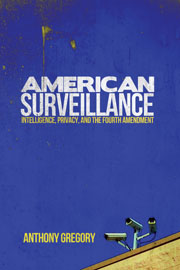The Bush Administration’s recent plan to make prescription drug abuse a main focus of the National Drug Control Strategy reveals just how embedded the government has become in the personal medical decisions of the American people.
The plan includes new state surveillance agencies that monitor prescription drug users to ensure they aren’t fishing for pushover physicians to prescribe “unneeded” pharmaceuticals—as well as multi-million dollar web crawling technology to seek out online drug companies that illegally sell controlled drugs.
The idea of Big Brother spying on your visits with your doctor may frighten you. But this isn’t the first time police-state tactics have been used against the healthcare choices of patients to enforce the government’s version of good medicine. The Food and Drug Administration (FDA), the agency that decides the legal status of drugs, has a history of pulling out the big guns—literally.
In 1987, more than two dozen FDA agents and U.S. Marshals, enforcing vitamin regulations, smashed into the office building of the Life Extension Foundation with a battering ram, aimed guns at the employees inside, and confiscated half a million dollars in vitamins, computers, merchandise, literature, and personal belongings. After years of legal battles and the FDA’s admission of numerous unlawful actions, including agent Martin Katz’s perjured testimony to obtain the search warrant, the agency finally backed down.
In May of 1993 FDA agents raided the home of Kirwin Whitnah, aiming guns at a woman staying there, all because Whitnah promoted the sale of Deprenyl—an FDA approved drug used to reduce brain degradation in Parkinson’s patients—and the agency considered this the same as illegally selling it. No Deprenyl was found, no one was charged with a crime, but agents still seized Whitnah’s computer, business records, mailing list, and $4,500 in money orders.
The FDA has even terrorized people over pet food. To enforce regulations on pet food labels, an FDA agent in 1990 seized merchandise from Sissy McGill and shut down her pet store, all without a warrant. The government put her in leg irons at her trial, fined her $10,000, and confined her to a maximum security prison for nearly six months, where she nearly died of a stroke. Interesting policy for an agency that ostensibly protects the health of Americans.
There are dozens of similar FDA horror stories. Few people expected these terrifying police raids to arise from FDA regulation of pharmaceuticals. We can’t predict what similarly frightening unintended consequences will arise from a federal surveillance program to spy on you when you go to the doctor.
To justify the need for new, extreme measures against prescription drug abuse, the White House cites a study that shows prescription drugs, as a group, are more abused than any illegal drug other than marijuana. This comparison raises some questions.
First, how does the FDA define “abuse”? The agency declares all marijuana use “abuse,” and non-medicinal. It also sets standards on what prescription drugs can be used for, which doctors often ignore. A General Accounting Office study found that 56 percent of cancer patients receive medicines for unapproved reasons. The FDA simply can’t keep up with medical science, and America’s doctors find that prescribing drugs for “off-label” uses saves lives. Should the FDA’s dictates override the millions of citizens who voted to legalize medical marijuana, and the thousands of doctors who prescribe medicines in politically incorrect ways?
Second, considering that billions of tax dollars are spent annually to imprison tens of thousands of marijuana smokers—and yet more people still “abuse” this totally banned substance than all prescription drugs combined—can we expect even the most draconian policies to curb prescription drug “abuse”?
The history of FDA raids and the failures in American drug policy demonstrate that the government’s policies on prescription drugs, taken to the extreme, are no more sane and no less violent than its war on illegal drugs. Regulation of all drugs—legal and illegal—begins with a flawed political process and ultimately relies on armed police raids. Expanding police and surveillance powers to stop prescription drug “abuse,” regardless of the amount of force or money used and the number of victims, will likewise fail just as such measures have failed to stop marijuana “abuse.”
The U.S. should abandon its failed drug war policies, not expand them. Medical treatment should be a personal matter, to be decided by patients and doctors. The liberties and money saved will be far greater than any benefits from the paternalistic prescription police that Bush plans to sick on America’s ill and addicted.








